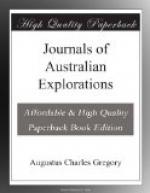The indifferent character of the country having caused the horses to stray in search of better food, we were delayed till 8.30 a.m., when we steered south-east over several low ridges of sandstone, wooded with white and paper-bark gum, with triodia in the hollows. Small dry watercourses trended to the north-east and north. At 10.20 crossed a creek ten yards wide, with pools of water, and at 1.5 p.m. a second of the same size, which trended to the east, was followed till 1.50, when a small pool of water and a little grass enabled us to camp. The country continues to be of a bad description, and covered with scrub, though of a more open nature than before, the soil more gravelly, melaleuca less frequent, and eucalypti and triodia more abundant. The rock is a coarse gray sandstone, thick bedded with horizontal strata, the lamina dipping 30 degrees to north-east generally; but varying much, the peculiar marking on the surface of the rock resembling the rippling of water, is frequent, forming grooves two to four inches wide and half an inch deep.
Latitude by a Trianguli Australis 15 degrees 59 minutes 45 seconds.
29th July.
A dense fog was the unusual cause of delay in collecting our horses, as they could not be seen more than a few yards distant. At 8.45 a.m. steered south-east through scrubs of melaleuca, acacia, grevillia, and eucalypti; at 11.0 the country became more open, and entering a grassy plain extending five to eight miles to the east, where it was bounded by a low range of hills; to the south-west a level forest of white-gum ran parallel to our route. The soil was a brown clay-loam with pebbles of sandstone; a few box and bauhinia trees grew on the plain; the grass had been burnt off and sprung up again very green. At 1.20 p.m. came on a large dry creek trending north-east; it had several channels twenty yards wide with loose sandy beds, and was bordered by casuarina, melaleuca, and flooded-gum trees; following down the creek, at 1.15 camped at a shallow pool in one of the side channels. About three miles before we reached the camp Dr. Mueller had fallen some distance behind the party; but as this was a frequent occurrence in collecting botanical specimens, it was not observed till we reached the creek, when he was out of sight; after unsaddling the pack-horses I was preparing to send in search of him, when he came up to the camp, the cause of delay having been that his horse had knocked up. This was unfortunate, as the load of one of the pack-horses had to be distributed among the others, in order to remount the doctor, who requires stronger horses than any other person in the party, having knocked up four since January, while not one of the other riding-horses had failed, though carrying heavier weights.
Latitude by a Trianguli Australis 16 degrees 7 minutes 50 seconds.
30th July.
There being abundance of good grass at this camp, we remained this day to shoe some of the horses and repair harness, etc., and rest the horses; nor was I sorry to get a day of comparative rest, as I had been in the saddle every day since leaving the Victoria on the 21st June. Eleven of the horses were re-shod.




